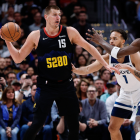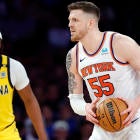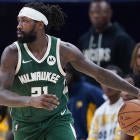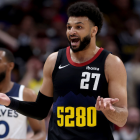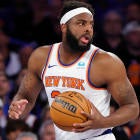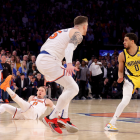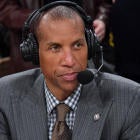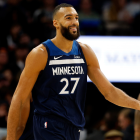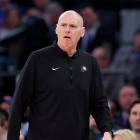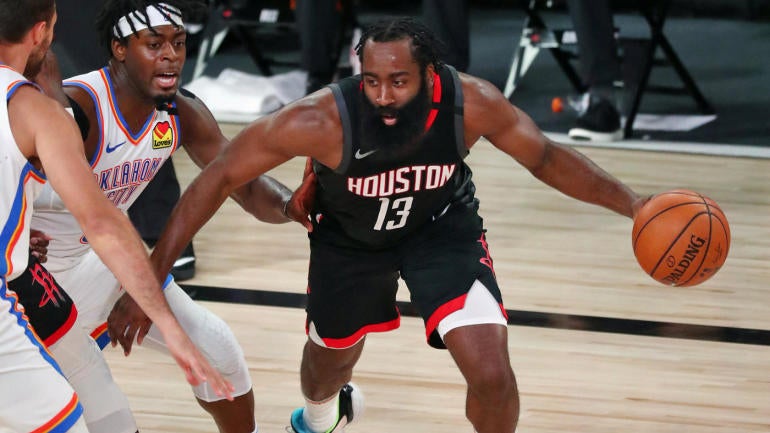
James Harden punctuated the idea that this postseason run will be different from his previous postseason failures with a single play in Wednesday's Game 7 victory over the Oklahoma City Thunder. The three-time defending scoring champion and one of Twitter's favorite lowlight targets won a game and a series for the Houston Rockets with his defense, blocking Luguentz Dort on a potential game-winning shot. The prevailing image of the series will forever be Harden, legs akimbo, dodging Dort's attempt to throw the ball off of him out of bounds to preserve a possession that might have shined a spotlight on the night's ultimate truth: this game was no different than any other big Harden moment.
Yet again, the former MVP came up short in a big moment, and it happened for the same reasons that it always does. Harden's playing style is simply less effective in the postseason, and one memorable moment won't change that.
Harden shot 4-of-15 from the field in Game 7. The former is concerning, but ultimately, to some extent, the result of randomness. Harden usually doesn't go 1-for-9 on 3-pointers. The latter is terrifying based on process. In the biggest game of the season, with his co-star recovering from an injury, Harden took only 15 field-goal attempts. Harden had only eight games in the entire regular season in which he took fewer than 16 shots. Blame Dort's incredible defense all you want, but a year ago, Kawhi Leonard managed to get 39 shots up with Jimmy Butler and Ben Simmons in his face. LeBron James, a far more passive star than Harden on most nights, averages 23.4 field-goal attempts in Game 7s, and only dipped below 20 in a single blowout.
It is a superstar's responsibility to control the offense in the biggest games of the season, but Harden, one of history's highest-usage players, just added yet another mysterious disappearance to his ledger. He already had two separate 2-of-11 shooting nights in closeout losses, first to Golden State in 2015, and then again against a Leonard-less Spurs team in 2017. Albeit in a different role, Harden attempted only 9.6 shots per game in the 2012 NBA Finals, and hit only 37.5 percent of them.
Even Game 6 was a maddening demonstration of Harden's big-game reticence. Russell Westbrook dominated the offense as Harden took only one shot in the competitive portion of the final four minutes. Houston played five full possessions in that span without Harden touching the ball, and on a sixth, his only touch came on the rebound that initiated it. Game 7 wasn't dissimilar. Harden scored only four fourth-quarter points.
The easy suggestion here is that Harden doesn't want the ball in big moments, but it probably isn't that simple. Harden does, after all, have some great playoff games to his name even if they're outweighed by his worst ones. The likelier explanation is that the gargantuan scoring load he carries all season exhausts him by the time the postseason arrives. Harden's love of... night life likely isn't ideal for conditioning either.
The mid-season hiatus offered a theoretical reprieve. Four months of rest perhaps could have allowed him to enter the postseason refreshed, but injuries to Westbrook and Eric Gordon forced him to carry perhaps the heaviest burden in the bubble. A steady string of second-half 3-pointers missed short in Game 4, Westbrook's final absence of the series, supports the notion that his legs are just worn out.
Many of Harden's postseason misses come off of the front of the rim, but even if exhaustion is an explanation, it isn't an excuse. Everybody is tired in the playoffs. The best players play through it. Whether it's a matter of conditioning habits or the burden placed on him by his team, Something needs to be changed to keep him fresh for the playoffs. Load management exists for a reason. Math suggests that an 0-for-27 shooting stretch on 3-pointers in Game 7 of the Western Conference Finals is merely bad luck, but that ignores the reality that when a team has only one true shot-creator and that shot-creator is too tired to create shots, his teammates are usually going to miss the bad looks they ultimately get.
There's an argument to be made that his gaudy free-throw totals forgive some of his low shot attempt numbers, but it's not as though Harden is matching his regular-season production on that front. His free-throw attempts have declined from their regular-season average five postseasons in a row, often significantly. Harden averaged 10.9 free-throw attempts per game over the last three regular seasons... but only 8.3 in the corresponding postseasons. That shouldn't surprise anyone. Whistles become notoriously rarer in the playoffs, especially in Game 7s. Tuesday's Game 7 between Denver and Utah, for instance, had 28 total free throws. Harden has nearly hit that total himself in the regular season. His individual career-high is 27. His nine attempts in Game 7 were, again, below his season average.
That free-throw hunting becomes problematic in a setting that discourages Harden's playing style. His 3-point percentage has declined from the regular season to the postseason five years in a row because he can't draw as many valuable three-shot fouls, which he often sells out for. Fewer calls at the rim make his drives less valuable. The one form of offense that does tend to become more valuable in the postseason is the one area on the floor Harden routinely ignores. Chris Paul attempted 37 mid-range shots in this series. Harden took 20... during the entire regular season. He averaged one per game in this series.
Logic supports that shot profile. It's analytically flawless and trusts that over a long enough sample, 3-pointers, layups and free-throws are far and away the most valuable shots on the floor. Those shots have made Harden arguably the greatest regular-season offensive player in NBA history, but the thought process behind them ignores the critical differences between regular-season and postseason basketball. The playoffs don't offer enough of a sample size to rely on the law of averages. Defenses take away the best looks on the floor and force superstars to hit contested looks in less valuable areas. Paul took the ninth-most mid-range jumpers in the NBA this season, and hit 54 percent of them. Unsurprisingly, he was the NBA's leading clutch scorer this season. Houston has had a top-five clutch offense only once across the past six seasons. It came during the 2017-18 season, Paul's only healthy year as a Rocket.
Paul probably shouldn't be a better clutch scorer than Harden. He's significantly smaller, and while neither are elite athletes, Paul has lost significantly more on that front at the age of 35 than Harden, who is still in his prime. But Paul's more diverse offensive game gives him a deeper bag of tricks to pull from when it counts. Defenders don't know what he's going to do in the final moments because he could do almost anything.
But Harden's game is predicated on doing only a few things at such an elite level that, on a night-to-night basis, it outweighs its homogeneity. But defending Harden across seven games makes him predictable. He's going to take a stepback, or he's going to drive. Houston doesn't even have a true center for him to use a screener anymore. Time makes defending him easier. The Thunder, by the end of this series, solved Houston's MVP.
That doesn't mean he's destined to choke forever or that the Lakers are a lock to beat the Rockets in the second round. If anything, that matchup favors Harden. Danny Green and Kentavious Caldwell-Pope are good defenders, but they aren't Dort.
But it points to a greater trend that is the single biggest reason Harden hasn't already won a championship by now. His history of falling short in big games is no longer a coincidence. It's an explainable trend. And one incredible block aside, Harden needed 11 3-pointers from Robert Covington and Eric Gordon just to escape the first round. Had that duo shot even 50 percent from behind the arc, he'd be fending off blame for yet another postseason humiliation right now.
And the fact that he isn't doesn't mean this playoff run is going to be any different. Harden fell short in Game 7 for the same reason he's fallen short so many times in the playoffs, and one nice defensive play doesn't magically cure those issues. They are probably going to rear their ugly heads again as Houston progresses in the postseason, and while the Thunder weren't good enough to punish them for it, one nice defensive play won't be nearly enough to overcome this caliber of offense against the Lakers or Clippers.














